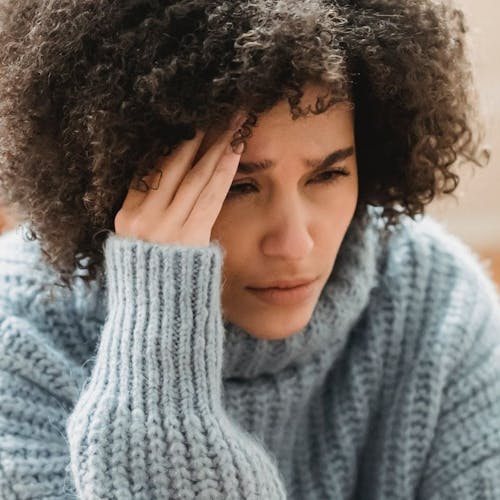This website uses cookies to enhance the user experience. By using Yoppie you are agreeing to our use of cookies.
How Stress Affects The Menstrual Cycle
Written by Yoppie
08 Jun 2020
Can my periods be affected by stress?
Can periods stop altogether because of stress?
What can I do to manage this?
Stress can affect everything. No really, everything. We’re talking sleeping patterns, eating habits, our interactions with others, our physical health. It can make our hair fall out or turn grey prematurely, give us unexplained rashes on our skin, and result in stomach issues, muscle tightness, teeth clenching, jaw tightening, foggy memory, weight fluctuations... you name it, stress can be a huge factor, if not the primary cause. It can even affect your periods. When it’s the physical type of stress, it’s easy to exercise less and rest more. But what about when it’s the emotional or mental type? Let’s look at how this can affect your period, and what you can do about it.
Can my periods be affected by stress?
Short answer: yes. Though there haven't been a lot of studies on the links between stress and periods, it has become clear that a connection does exist. Excessive stress has been found to suppress the hypothalamus. This controls the pituitary gland which affects the thyroid and adrenal glands, as well as the ovaries that manage your hormones. When this happens, it affects the production of estrogen and creates dysfunction when it comes to ovulation and other reproductive processes.
This leads to irregular periods, and sometimes missed periods altogether. It’s important to understand the possibility of stress affecting your periods, but it’s also crucial to know when to see a doctor. The most obvious cause of missed periods can be pregnancy, but if you’ve ruled this out then it’s worth discussing several missed periods with your doctor to ensure there’s nothing else going on.
Can periods stop altogether because of stress?
Yes, this is known as secondary amenorrhea, and it is when someone’s period completely disappears while still in their reproductive years (i.e. somewhere between puberty and menopause). It doesn’t mean a person is infertile, but it can be an indicator of an underlying health problem, so is another reason to visit your doctor or healthcare professional. Primary Amenorrhea is when a young girl’s period does not begin during puberty, and Secondary Amenorrhea is when someone’s period has already started, but then stops for unknown reasons. It’s often diagnosed if someone who had regular periods does not have one for a minimum of 3 months, or if someone who had irregular periods does not have one for a minimum of 6 months. There are a number of possible causes for this, including illness, gynaecological issues, and low BMI (body mass index), but oftentimes it happens due to some kind of emotional trauma or extreme stress.
What can I do to manage this?
If you have been diagnosed with amenorrhea, your doctor will suggest a plan for bringing back your period and ensuring you are as healthy as you can be.
If stress is identified as the cause, the first order of business will be reducing the amount of stress in your life. Your doctor may suggest medication to help with this, or some sort of therapy like CBT (cognitive behavioural therapy), to help your body return to its natural functions. It’s also important to remember that if you’re stressing about your period in general, this is only going to worsen the effects. Try to relax and know that your body will course-correct if you take care of yourself.
Here are a few things you can do to reduce stress:
- Identify the primary stressors in your life and look at ways of eliminating them
- Edit your daily schedule to incorporate more downtime
- Start regularly meditating using an app like Calm or Happy Not Perfect
- Keep a ‘stress diary’ to identify any triggers and causes
- Find stress-relieving activities that work for you, like reading, crafting or cooking
- Go for regular walks to cool off when things get to be too much
Have your periods been affected by stress? We’d like to learn about your experience. Let us know how you are working to regulate your menstrual cycle, over on Instagram @itsyoppie. Don't forget that our personalised period subscription box can get organic cotton tampons, PMS supplements, and much more, delivered easily and regularly through your letterbox. Now that's stress-reducing.
Fact checked by Doctor Brooke Vandermolen.
Section jump
Back to top
Subscribe To Our Newsletter
YOPPIE





© 2026 Yoppie is a registered trademark of Phlo Technologies Ltd.
Yoppie's supplements are not a substitute for a varied diet and healthy lifestyle and are not intended to diagnose, treat, or cure any disease. If you are pregnant, breastfeeding, have a medical condition or are under medical supervision, please consult with your doctor before taking any of our products.






